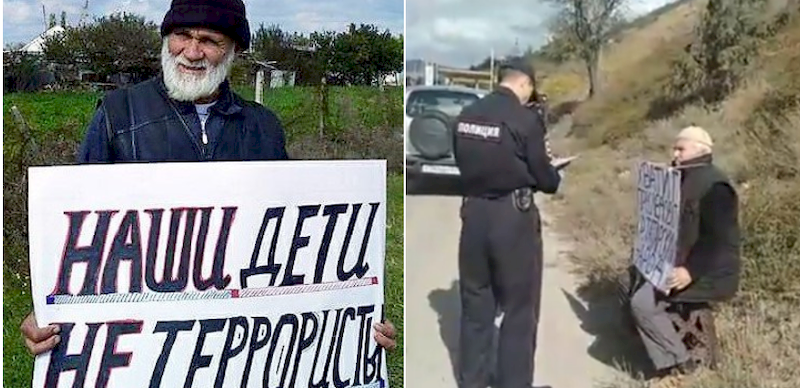Racist grounds given for mass persecution of Crimean Tatars in occupied Crimea

Police in Russian-occupied Crimea have on several occasions tried to justify detaining Crimean Tatars holding legal solitary pickets by claiming that their protest “aroused dissatisfaction among the Slavonic population”.
The Crimean Human Rights Group reports that such examples of discrimination against Crimean Tatars on ethnic grounds can be found in several of the administrative protocols used to prosecute people whose actions were in full compliance with Russia’s repressive anti-protest laws.
The document CHRG publishes, states that “unidentified individuals are holding unauthorized mass protests disguised as single-person pickets, by placing the Crimean Tatar population along highways and city roads … which arouses dissatisfaction among the Slavonic population of Crimea”.
In fact, one of the people who received such an ‘explanation’ is an ethnic Russian Muslim, but this in no way negates the worrying racism of such excuses produced by police officers under Russian occupation.
What other forms of persecution for peaceful and legal activities will be explained as being because other ethnic groups object?
At least 81 people have thus far been prosecuted for the solitary pickets on October 14, 2017. On that day, over 100 Crimean Tatars came out in single-person pickets to protest against the latest arrests of Crimean Tatars, many of them civic activists from Crimea Solidarity. Each held one or two placards with messages like: “Our children are not terrorists!”; “Give children their fathers back, Crimean Tatars are not terrorists!” and “Fabricating criminal cases – it’s this that’s TERROR”.
Even Russian legislation does not require ‘authorization’ for single-person pickets, yet 49 of the picketers were detained that day, with the claim being that they were taking part in ‘unauthorized pickets’. All were, however, released, without their placards, which would assuredly not have been the case had there been any possible grounds for laying charges.
After the pickets, the occupation regime began reverting to open intimidation with those who had taken part facing visitations to their home and summonses for interrogation. They demanded to know who had ‘organized’ the pickets, and grilled them even on where they had found the marker pens and paper used.
With typical contempt even from Russian law, they then initiated administrative proceedings under Article 20.2 § 5 of Russia’s criminal code, for supposed infringements of the rules for holding a picket. There had been no infringements, hence the use of arguments about annoying “the Slavonic population” and claims that since there were many such pickets, that together they constituted an ‘unauthorized public event’.
The prosecution has also asserted that placards saying ‘Free Crimean political prisoners’; ‘Enough of terrorizing the Crimean Tatar people’ and ‘Crimean Tatars are not terrorists’ are “united by the same general idea and theme direction”.
They are, in fact, united by the same reality in Russian-occupied Crimea – the mounting number of political prisoners and other forms of repression. One of the most prominent messages – “Our children are not terrorists!” was taken from a placard prepared by 76-year-old Server Karametov. In August 2017, this frail and elderly Crimean Tatar, who suffers from several serious medical conditions, was seized while standing in defence of political prisoners outside the ‘trial’ of Crimean Tatar leader Akhtem Chiygoz. He was not only fined 10 thousand roubles, but actually imprisoned for 10 days for ‘showing resistance to the police’. It was small wonder that other Crimean Tatars should have begun coming out on the streets with similar placards.
The ‘courts’ in occupied Crimea virtually never question such cases, however openly lawless, and fines have been imposed on each legal solitary picketer of 10 or 15 thousand roubles (with the overall amount believed to be in excess of 850 thousand roubles).
In April 2016, the UN International Court of Justice at the Hague began proceedings in Ukraine’s suit against Russia over violation of the latter’s commitments under two UN conventions, the International Convention for the Suppression of the Financing of Terrorism and the International Convention on the Elimination of All Forms of Racial Discrimination.
The Court agreed that there were grounds for imposing provisional measures against Russia over evidence of discrimination against the ethnic Crimean Tatar and Ukrainian population of Crimea. It specifically ordered Russia to revoke its ban against the Crimean Tatar Mejlis, or self-governing body, and the restrictions on education in the Ukrainian language.
Having promised to comply with the ICJ’s ruling, Russia has, instead, simply ignored it, and all the above forms of discrimination – and others – are continuing.





